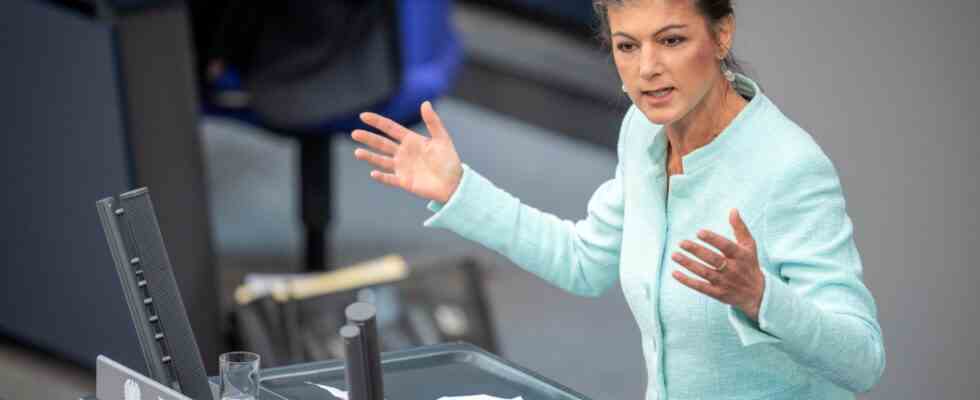Status: 09/13/2022 04:20 a.m
The Left Party is struggling with weak poll numbers and falling acceptance among regular voters. In addition, the party’s most popular personality does not represent what the party line is. The dispute could even break the parliamentary group.
It was already clear a week ago that Sahra Wagenknecht’s speech in the budget debate in the Bundestag would lead to an uproar. Wagenknecht does not tend to keep her beliefs to herself. She says what she thinks, and she does it loudly and pointedly. That could be good for the smallest parliamentary group in the Bundestag, but it is actually a big problem. Because the member of parliament to whom the public listens the most represents an opinion that is now an impertinence for a number of parliamentary group colleagues.
This dispute was already a topic at the parliamentary group meeting last week. It is said to have been controversial because a number of MPs had suspicions when they thought of Wagenknecht’s convictions, which had already written in advance of an “economic war of the West against Russia”.
And it’s no secret that faction leader Dietmar Bartsch then spoke to Wagenknecht again. His most important goal: Wagenknecht should not explain her opinion on Nord Stream 2 in parliament. That would go completely against party opinion.
Wagenknecht’s controversial proximity to Russia
To summarize briefly: The Left Party has spoken out in favor of sanctions against the Russian economy, while Wagenknecht opposes them. The Left Party sharply condemns Russia’s war against Ukraine, Wagenknecht speaks of an economic war against Russia. The Left Party is against the commissioning of Nord Stream 2, Wagenknecht for it.
The issue of Nord Stream 2 is already being referred to behind closed doors in the Bundestag faction as the unspeakable “NS word” because it is so dividing the party.
Anger and applause from the AfD
On the evening before Wagenknecht’s speech in the Bundestag, it is also clear that several MPs will not be there while Wagenknecht is speaking. “I’ll probably have an appointment right now or have to eat something,” you can hear. The annoyance that the parliamentary group leader nominated Wagenknecht as a speaker is great. With Ralph Lenkert, the political spokesman for the parliamentary group for environmental policy and energy and climate protection, it is so great that he resigns from this job.
A good part of the left-wing faction, which has 39 MPs, is actually not there when the so-called icon of the party speaks in front of the Bundestag. But when Wagenknecht said in front of Parliament exactly what she had previously formulated in newspaper articles, what she had tweeted and what she said on her YouTube channel, the leaders of the parliamentary group, Bartsch and Amira Mohamed Ali, applauded clearly, while the other parliamentary groups expressed their outrage proclaim the words of Wagenknecht aloud. It should be noted, however, the applause of the AfD faction for Wagenknecht.
Strong distancing
MP Martina Renner wrote on Twitter after the speech: “The phrase: ‘US economic war against Russia’ is Kremlin propaganda.” Her colleague Caren Lay writes: “To speak of an ‘economic war against Russia’ distorts the facts. Calling for the abolition of all sanctions is not our position!”
And Kathrin Vogler writes: “Putin imposed a gas embargo on Germany, not the other way around. As a social opposition, you have to be clear about that,” addressing her own faction. At the beginning of August, MP Cornelia Möhring tweeted: “Sahra Wagenknecht. You are only formally my fellow party member.”
Charged atmosphere in the board
The mood of the party executive, which met in Rathenow last weekend, was similarly charged. Most of the members of this body do not agree with Wagenknecht. The two party leaders, Janine Wissler and Martin Schirdewan, clearly distance themselves from Wagenknecht’s positions. And again and again one hears “that the leadership of the parliamentary group must finally catch Sahra”.
But that’s exactly where the problem lies. Wagenknecht is not only one of the most prominent left voices in public. She is not alone in the group either. As passionately as some of the deputies distance themselves from her, others stand by her side. And they no longer feel particularly valued in their group.
Eight to nine MPs could therefore decide to leave the parliamentary group and form a new group in the Bundestag. At least ten faction members signed the appeal for a popular left, which Wagenknecht helped launch in May of this year. That would be the end for the left-wing faction. Even if three MPs left, the parliamentary group would lose its status and would only be one group in the Bundestag, which means fewer rights and less money.
Battle for the “renegades”
So it is the faction leadership’s increasingly desperate attempt to keep these possible “renegade” in the faction. This is also why Bartsch decided to give Wagenknecht the coveted speaking time in the Bundestag, which is also why he gave Klaus Ernst the only committee chair job that the Left Party still has.
However, it doesn’t work. Ernst and Wagenknecht, at least, seem to enjoy voicing their beliefs loud and clear, ignoring the fact that party convention resolutions say something completely different. If you ask Wagenknecht why she speaks like that, the answer comes quickly and briefly: “Because it is like that.”
The fact that Wagenknecht called for the resignation of Federal Minister for Economic Affairs and Climate Protection Habeck at the end of her speech in Parliament was not agreed with the parliamentary group. But that’s almost a petitesse when you see the degree of disruption in the faction. Ten years ago, at the party conference in Göttingen, Gregor Gysi spoke of the fact that hatred prevailed in the parliamentary group. This is the case again.

